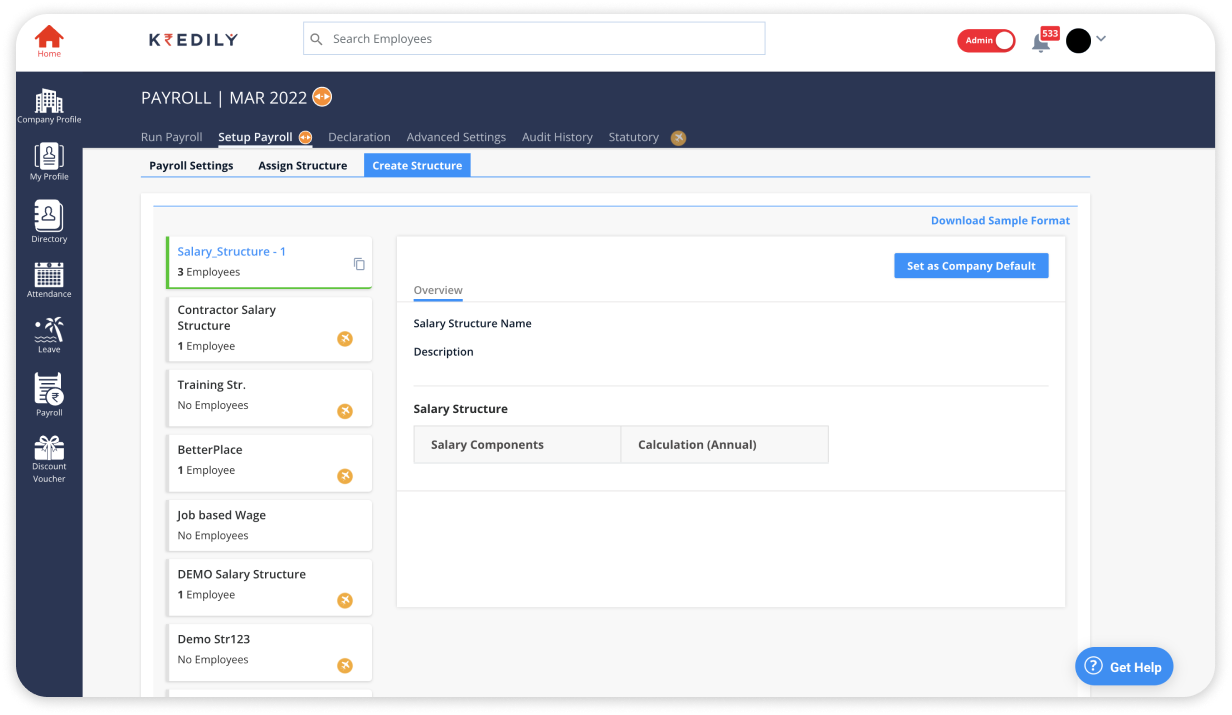Custom Salary Structure for Indian Workplaces
Easily create salary structures tailored to your organization’s needs.
Existing User? Sign In
Easily create salary structures tailored to your organization’s needs.
Existing User? Sign In
Easily create salary structures tailored to your organization’s needs. Customize pay grades, salary breakups, and allowances for different roles. This flexibility ensures that your company’s salary structures are aligned with internal policies and external expectations, fostering equity across all departments.
The salary structure builder is designed to comply with Indian payroll regulations, ensuring your salary structures meet tax laws, statutory benefits, and compliance requirements. This minimizes the risk of non-compliance and penalties, keeping your organization secure.
Whether you’re in tech, healthcare, manufacturing, or any other industry, the salary structure tool adapts to your unique needs. Design pay structures that are specific to various roles—from entry-level to senior executives—catering to the demands of your sector.
The salary structure tool automatically calculates salaries based on the structure you’ve created. This eliminates manual errors and saves valuable time, allowing your team to focus on strategic HR initiatives while ensuring accurate and timely salary payouts.


Get started instantly using salary structure templates designed for Indian businesses. Spend less time configuring and more time growing.

Create pay structures tailored to your business. Add or remove salary components, set limits, and build custom salary arrangements that match your compensation strategy.

No complex tools or training are needed. The intuitive interface helps HR teams build, edit, and manage salary structures quickly and confidently.
Establishing a well-defined salary structure is crucial for a business for several reasons. Firstly, it provides a framework for determining and allocating compensation within the organization, ensuring fairness and consistency. A well-structured salary system helps attract and retain talented employees by offering competitive pay that aligns with industry standards. It also promotes internal equity, as employees within similar roles or levels receive comparable compensation, reducing potential grievances and conflicts. Moreover, a clear salary structure enables effective budgeting and resource allocation, allowing businesses to plan and manage their labor costs more efficiently.
Developing an effective salary structure requires a comprehensive understanding of the business's goals, market conditions, and employee roles. It typically involves several steps. First, the business needs to conduct market research to benchmark salaries for similar roles in the industry, taking into account factors such as geographic location and industry standards. Then, job evaluation and classification should be performed to determine the relative value and complexity of different positions within the organization. Afterward, businesses can establish salary ranges or bands for each job category, considering factors like experience, skills, and performance. Regular reviews and updates should be conducted to ensure the salary structure remains competitive and aligned with market trends.
A well-structured salary system can significantly contribute to employee retention and reduce turnover. When employees feel that they are being fairly compensated for their work, they are more likely to stay with the organization. A clear salary structure ensures that employees understand how their pay is determined and that there is consistency and transparency in compensation practices. This reduces the likelihood of employees feeling undervalued or underpaid, which are common reasons for seeking employment elsewhere. By offering competitive salaries and opportunities for growth within the organization, businesses can create a more engaged and loyal workforce, leading to higher retention rates and lower turnover costs.
Statutory compliance refers to the adherence to laws, regulations, and rules set by the government or relevant authorities regarding employee compensation, benefits, and deductions. It ensures that employers comply with legal requirements while designing and managing salary structures.